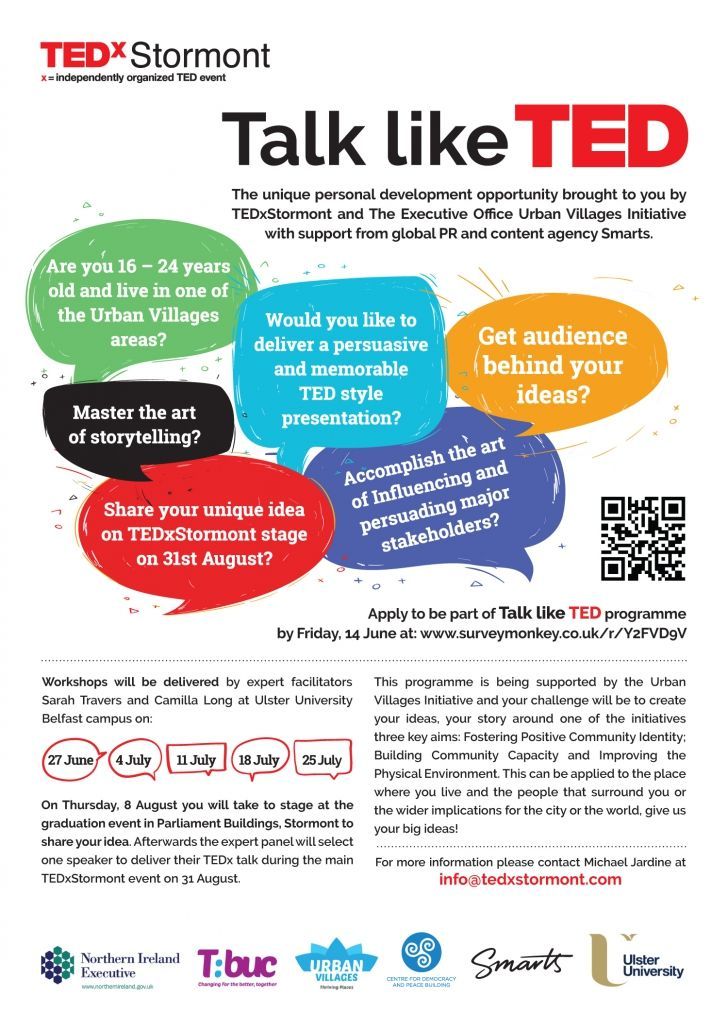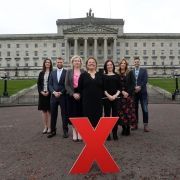New policy paper shines a light on Northern Ireland’s challenges
Northern Ireland is unprepared for a fast-changing world and faces serious problems unless there are big changes in policy, according to a report published today by a new local think tank.
Our problems include a health service in crisis, a schools system that fails many children, and a struggling economy that lags behind much of the UK. Currently one in four local children live in poverty, division between communities remains entrenched, and we are making few plans to help tackle climate change.
Pivotal is the only independent think tank in Northern Ireland. Its first publication, Moving forward – putting Northern Ireland on track for the future, examines the significant issues facing us.
Ann Watt, Director of Pivotal, said: “This report shows just how urgently Northern Ireland needs new thinking and new policies. We have serious problems in areas like health and education where long-term issues are coming to a head. Crises like a crumbling health service, and schools going over budget, are not on the horizon – they are here. We have had no government for almost three years and uncertainty around Brexit continues. Most of our political discussion focuses on those issues – which are, of course, important – but unfortunately at the same time our other problems are getting worse. There is an election in a few weeks and, although the polls concern Westminster rather than Stormont, I look forward to our local parties’ manifestos, and their visions for the change we need.”
Moving forward – putting Northern Ireland on track for the future identifies six major policy areas where transformation is required:
The economy – NI has the highest percentage of low-paying jobs of any UK region, and is one of only three regions with more jobs paying poorly rather than well. Our rate of economic inactivity is the highest in the UK, at 25.8% – meaning over a quarter of all adults are neither in work nor looking for work – and the gap between our public spending and the tax revenue we raise is £4,939 per year, per person.
Health and social care – demographic change means rising demand for health and social care. However, little has been done to make the structural changes needed to provide for these changes in demand. Today, the signs of crisis are clearly showing.
In March this year, there were 1,154 people who had been waiting over a year for planned care in England. In Wales that number was 4,176. In Northern Ireland, it was 120,201.
Only 5% of health spending goes on mental health provision, half the proportion spent in England – despite estimates showing instances of mental ill health are 25% higher in Northern Ireland.
Social care is stretched to breaking point, while demand continues to increase. Between 2018 and 2043, the numbers of people in NI aged over 65 and over 85 are projected to rise by 56% and 106% respectively. Over the same period, the overall population will rise by only 6%.
Education – our segregated education system has elements of excellence but suffers from major inequality: The proportion of students getting ‘good’ GCSEs – at least five A*-C, including English and maths – is 94% in grammar schools but only 52% in secondary schools. 52% of pupils entitled to Free School Meals got five ‘good’ GCSEs compared to 80% of pupils who are not entitled to Free School Meals. 78% of pupils entitled to Free School Meals attend secondary schools, and only 22% attend grammar schools. Our education system is expensive, and finances are stretched. There are just over 1,000 schools in Northern Ireland and this year 451 of them went over budget, with a total funding shortfall of £62.6m.
Poverty – children here are more likely to live in poverty than adults (one in four, vs one in five). Failures in the education and training systems contribute to persistent poverty across generations.
Northern Ireland has the highest percentage of children living in long-term workless households out of all UK regions – 13.6% of children, compared with the UK average of 8.2%. Children growing up in workless households are much more likely to have lower educational attainment, be unemployed, and live in poverty later in life.
Climate change – the world is in a state of climate emergency and there is a growing global movement for change involving governments, businesses and societies. Northern Ireland has yet to take a seat at the table.
A decade after the UK Climate Change Act, Northern Ireland has set no emissions targets – unlike Scotland and Wales, both of which set their own targets in addition to those for the UK as a whole – and enacted no legislation. Since the Act came into force, emissions here have fallen by just 9% compared with 27% across the UK in general.
Community relations – social division cuts across all policy and debate here. Key public services like education and social housing remain largely divided along lines of perceived culture and community.
However, division along sectarian lines is not the only issue we face. There is a racially motivated hate crime an average of three times a day, despite the relatively small number of people here from ethnic minorities or from other countries.
Ann Watt, Director of Pivotal, said: “Northern Ireland faces a lot of challenges and a new approach is needed to meet them. The purpose of Pivotal, as an independent think tank focused on good policy, is to help with that. Our first paper is the beginning of that process, highlighting major areas of need affecting people here in Northern Ireland. These need everyone’s attention, right now.”
In the coming weeks, Pivotal will release a paper looking at how to ensure good government here in Northern Ireland. Early next year it will launch Vision 2040, a flagship project looking at the kind of place people here want Northern Ireland to be in 20 years’ time.
For more information please visit Pivotal website HERE
General Elections 2019 #BeeKind
As we are approaching the General Election 2019, almost every day we see reports of online abuse, bullying, misogyny and hatred.
Families are being threatened, victims of the Troubles re-traumatised and candidates across the political spectrum intimidated.
It is not acceptable. We are launching a small campaign in Northern Ireland as a gentle reminder that even if we disagree about everything, we can still be kind to each other.
Join us on Twitter @CDPB_NI and use hashtag #BeeKind.
TEDxStormontWomen returns to Parliament Buildings in December
The TEDWomen 2019 conference will be in December 2019 in Palm Springs, California and we are delighted to join the global TED community and host our local, independently organised TEDxStormontWomen event in Parliament Buildings, Stormont on Thursday, 12 December.
This year’s theme, “Bold + Brilliant,” speaks to the ways in which 2019 is the year to be bold and brilliant – without apology. We will be shining a spotlight on dazzling ideas from some of the world’s most extraordinary risk-takers and innovators and celebrating pioneers making power moves, brilliant people who are just getting started, and those who tirelessly show up as allies and advocates.
And we also want to be BOLD. In a run up to the TEDxStormontWomen, together with our partners, we will deliver special TEDxStormont Masterclass to 500 girls and women across Northern Ireland.
The aim of this cross-community intergenerational capacity building programme for girls and women is to help them to become more confident in public speaking, able to connect with their audiences, develop new ideas and communicate what makes them and their stories unique. The programme will be delivered in partnership between the Centre for Democracy and Peace Building and Bespoke Communications, including Sarah Travers, Camilla Long and a team of expert facilitators.
• Book tickets HERE
• Nominate speakers HERE
• Partnership opportunities: Chris Brown at chris@brownoconnor.com or Eva Grosman at eva.grosman@democracyandpeace.org.
• TEDxStormont Masterclass enquiries: Eva Grosman at eva.grosman@democracyandpeace.org or Camilla Long at camilla.long@bespokecomms.net
Final TEDxStormont spot up for grabs – showdown to find one young speaker to take place at Stormont on 8 August
Eight young participants from the Urban Villages areas in Belfast and Derry/Londonderry will meet for a final head-to-head to decide who will win the coveted final spot in this year’s TEDxStormont line-up on 31 August at the Great Hall, Parliament Buildings, Stormont.
The ‘Talk like TED’ programme, which has been supported by The Executive Office Urban Villages Initiative along with global PR and content agency, Smarts, will see the finalists battle it out on 8 August at Stormont, delivering a range of talks on their unique and special experiences all centered around the TEDxStormont theme of ‘Imagine’.
The young storytellers will assemble in front of an esteemed panel of communications and good relations experts including:
• Pippa Arlow, Global Chief Executive of global PR and content agency, Smarts
• Mark Browne, Deputy Permanent Secretary in the Executive Office
• William Crawley, Broadcaster, Presenter and host of TEDxStormont 2019
• Eva Grosman, Curator of TEDxStormont
The winner will then take to the red dot on 31 August joining well-known faces such as internationally renowned contemporary artist, Colin Davison, entrepreneur Deepa Mann-Kler and owner of Boden Coffee Company, Orla McKeating for an inspirational day of ideas and stories from across a vast range of backgrounds and sectors.
The participants have taken part in the ‘Talk like TED’ programme over the last 5 weeks, led by broadcaster, Sarah Travers, learning how to be confident, connect with their audience, and highlighting what makes them and their story unique in order to prepare one of them to take to the stage in front of a live audience of 200 people and a huge audience online.
This programme has been supported by The Executive Office Urban Villages Initiative and global PR and content agency, Smarts, based in Belfast, who have also offered up a mentorship at the prestigious firm as part of the winning prize.
Mark Browne, Deputy Permanent Secretary in the Executive Office, with oversight of the Urban Villages Initiative, said:
“I am delighted that the Urban Villages Initiative was able to support the ‘Talk like TED’ programme and TEDxStormont. This has been an excellent opportunity for young participants from Urban Village areas to learn new skills and develop their ability to communicate more effectively.
“The aims of the Urban Villages Initiative include building community capacity and fostering positive community identities. This fantastic programme has allowed these young people to do just that, as they have worked closely with participants from different backgrounds and perspectives to share and develop their ideas.
“I congratulate these young people on their hard work – they have really come into their own. It is great to see that they have the confidence to tell their own personal story and to realise that they are unique and worth listening to. To be able to hear them express themselves on such a big platform as TEDx is really exciting and inspiring. What great ambassadors they are for their communities!”
Pippa Arlow, Global Chief Executive at Smarts, added:
“We are thrilled to be backing TEDxStormont and the ‘Talk like TED’ programme. Communication is such an important part of any organisation, and indeed a vital personal skill to have. This experience has challenged the finalists and tested their skills in speech making and how to communicate their story effectively. It is fantastic to be able to give the participants the opportunity to take to the TEDx stage, which only a select number of people have had.
“We are also excited to be able to give the chosen speaker the chance to join us at Smarts after TEDxStormont. As part of our mentorship programme, we want to be able to nurture this exceptional talent and hope to be able to build on what they have already learned during the sessions and want to further inspire and grow the winner into a fantastic communications professional.”
Eva Grosman, Curator of TEDxStormont commented:
“Over the past 5 weeks, we have had a fantastic time, engaging with the participants and their inspiring stories. The wealth of talent and openness shown by the participants has far exceed our imaginations and whoever wins the spot on the red dot will deliver a talk that will really resonate.
“It has been so interesting to listen to the participants views and to see what they imagine for Northern Ireland’s future, and the faith they have for a better and more hopeful time to come. This without doubt is going to be such a special part of TEDxStormont on 31 August.
“We would like to extend our thanks to the Executive Office Urban Villages Initiative and Smarts for being such fantastic partners, and helping to bring the participants together, along with the special guest appearances during the sessions. It has been an extraordinary programme.”
TEDxStormont set to return to Parliament Buildings
TEDxStormont is set to return to Parliament Buildings on 31st August with a stellar line up of 18 speakers from varied backgrounds such as journalism, music, business and the arts. The daylong event, compered by Presenter and Broadcaster William Crawley, is expected to see 200 guests fill the Great Hall at Parliament Buildings with a larger than ever online following.
In a fitting tribute to murdered journalist and former TEDxStormont 2017 speaker, Lyra McKee, her sister Nichola Corner and friend Stephen Lusty will take to the red spot.
Since its inception, the TEDxStormont series of talks have been viewed over 5 million times with Lyra McKee’s talk on religious and social intolerance viewed almost 150,000 times alone.
Started as a four-day conference in California in 1984, TED and the TEDx programme has grown to support world-changing ideas with multiple initiatives such as TEDxStormont which has now run eight live events in the series.
The overall theme of TEDxStormont 2019 is “Imagine” – with speakers looking forward and imagining the kind of future we could have together as a society, here in Northern Ireland and beyond.
TEDxStormont 2019 speakers being announced today include:
Session 1:
Laura Banks – Lawyer, Mum, Social Justice Advocate
Connor Kerr – Creative Activist and Campaigner. Co-Founder Another World Belfast.
Duncan Morrow – Academic and Community Activist
Orla McKeating – Entrepreneur, Podcaster, Collaborator
Amanda Campbell – VP, Founder and Strategist
Joe Nawaz – Thoughtful, reckless, contradictory
Session 2:
Jess Dornan Lynas – Storyteller, Tech-Founder, Creative
Stephen Lusty – Technologist, Entrepreneur, Samaritan
Fergal McFerran – Activist, Uncle, Optimist
Siobhan O’Neill – Scientist, Mental Health Advocate and Mother
Nichola Corner – Spiritualist, Courageous and Loyal
Alice McCullough – Writer, Performer, Artist
Session 3:
Tim Brundle – Director of Research and Impact
Una Jennings – Copper, mummy and multitasker
Colin Davidson – Contemporary Artist
Deepa Mann – Kler – Artist, Technologist and Author
Saul Betmead – Creative strategist. Part-time behavioural scientist. Test & learner
Launching the speakers today, Eva Grosman, Curator of TEDxStormont 2019 said:
“TEDxStormont 2019 has really captured the imagination and we can certainly feel the excitement building ahead of the event at the end of August.”
“The backdrop of the Great Hall in Parliament Buildings is apt after a long period of political paralysis. The speakers lined up will help us to imagine that a new way forward is possible.”
“This year, as part of the speaker event, we will be working with The Executive Office Urban Villages Initiative and running a ‘Talk like TED’ youth training programme. The young participants from five Urban Villages areas will take part in a series of workshops in the weeks leading into TEDxStormont at the end of August. One finalist will be selected to take to the stage at Stormont and deliver their TEDx talk.”
“This is a really exciting element and shows that this is not just a one-off event but acts as a catalyst for other projects and programmes that are community based and allows for young people with great ideas to have those ideas amplified to a huge audience.”
Talk like TED – Urban Villages Initiative for Young People
TEDxStormont organised by the Centre for Democracy and Peace Building is joining forces with The Executive Office Urban Villages Initiative, Ulster University and global PR and content agency Smarts, to provide a unique personal development opportunity to young people (16 – 24 years old) living in one of the Urban Villages areas.
Talk like TED
Would you like to deliver a persuasive and memorable TED style presentation?
Master the art of storytelling?
Get audience behind your ideas?
Accomplish the art of Influencing and persuading major stakeholders?
Share your unique idea on TEDxStormont stage on 31st August?
Apply to be part of Talk like TED programme by Wednesday, 19 June at: https://www.surveymonkey.co.uk/r/Y2FVD9V
Workshops will be delivered by expert facilitators Sarah Travers and Camilla Long at Ulster University Belfast campus on:
• 27 June
• 4 July
• 11 July
• 18 July
• 25 July
On Thursday, 8 August you will take to stage at the graduation event in Parliament Buildings, Stormont to share your idea. Afterwards the expert panel will select one speaker to deliver their TEDx talk during the main TEDxStormont event on 31 August.
This programme is being supported by the Urban Villages Initiative and your challenge will be to create your ideas, your story around one of the initiatives three key aims: Fostering Positive Community Identity; Building Community Capacity and Improving the Physical Environment. This can be applied to the place where you live and the people that surround you or the wider implications for the city or the world, give us your big ideas!

About TED and TEDxStormont
TED is an annual event that brings together the world’s leading thinkers and doers to share ideas that matter in any discipline — technology, entertainment, design, science, humanities, business, development. The talks at the conference, called TED Talks, are then made available to a global audience to watch for free on TED.com.
In the spirit of “ideas worth spreading,” TED has created TEDx, a programme of local, self-organised events that bring people together to share a TED-like experience.
TEDxStormont event will take place on Saturday, 31 August 2019 in the Great Hall, Parliament Buildings, Stormont. We are bringing together a range of exciting speakers to inspire our audiences, as we believe passionately in the power of ideas to change attitudes, lives and ultimately the world.
The overall theme of TEDxStormont 2019 is “Imagine” – we will look forward and imagine the kind of future we could have together as a society in Northern Ireland and beyond. For more information please visit https://www.tedxstormont.com






